Work Experience At Africa Innovations Institute (AfrII) Implementing Cascade Project
By Amiya Esther Keith
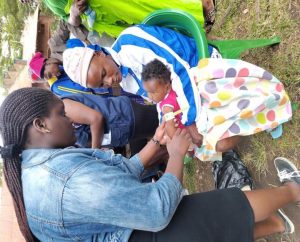
Esther screening a child for malnutrition during an integrated child health day hosted by Ministry of Health and supported by AfrIIi Fortportal city, Toro Subregion
Being my first time in Fort Portal, I was concerned about a lot of things, language, climate, meeting new people, working in an organisation for the first time. Putting all my anxiety aside, I embarked on my journey to Fort Portal and just as we were about to arrive, I was struck by a wave of coldness that I had never experienced before. I thought to myself “maybe the city is warmer”, not knowing that Fort Portal is nestled in the shadow of the Rwenzori Mountains.
Upon arrival, I was warmly received by the Care International team and Toro AfrII team, notably Mr. Wilson Kirabira and Ms. Mirembe Winnie. I was immediately oriented to familiarize myself with the organization’s goals, objectives, thematic domains, and core activities. I was also introduced to AfrII’s structural framework and key personnel, including extension workers and Community-Based Facilitators (CBFs). Eager to make the most of every opportunity.
I was immediately initiated into diverse range of activities from conducting food demonstrations and Social Behavioural Change Communications (SBCC) campaigns in schools and markets to engaging in hands-on garden work, training agricultural extension workers and CBFs, and participating in nutrition review meetings, reporting using mWater to mention but a few. This comprehensive experience provided me with invaluable all-round learning and development. I encountered no challenges collaborating with any member of the Africa Innovations Institute (AfrII) team, thanks to a highly supportive environment that fostered both my professional growth and formative development.
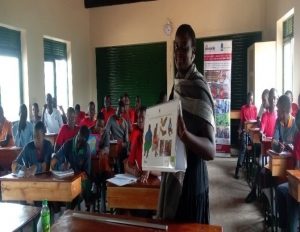
Esther holding a counselling session with students of Samling Peas Kicwamba High School
I derive great fulfillment from observing young children emulate the concepts that we taught them, and I take pride in facilitating community-led initiatives that drive meaningful transformation. It is a privilege to see the smiles and transformative change that AfrII brings to communities and to be a part of the team driving that transformation is an even greater honour. AfrII champions nutritional security for women by building their capacity across the entire food cycle, from sustainable production and hygienic preparation to healthy consumption. The benefits and impact of AfrII-CASCADE is beyond measure and above all it has educated communities on the complex dynamic of nutrition which has a foundational and long-term impact. I am deeply grateful to AfrII for the opportunity to be part of the incredible team and I want to give a special thank you to Ms. Winnie Mirembe, who has been much more than a supervisor, she has been a guiding mentor and a constant source of inspiration.

Construction of Keyhole gardens (Climate Smart Agriculture) in different schools
The author served as an intern with the CASCADE project at the Africa Innovations Institute.
Fostering Water Security and Catchment Resilience in Uganda’s Cattle Corridor (LDCF Uganda Cattle Corridor)
The Africa Innovations Institute (AfrII) is honored to be featured in New Vision (Page 26, 9th July 2025), in recognition of its pivotal role in promoting climate-smart and community-led solutions across Uganda’s livestock corridor. This recognition follows AfrII’s active engagement in the Stakeholder Consultation Workshop on Water Security and Catchment Resilience, held on 3rd July 2025 at Golf Course Hotel, Kampala.
Organized in collaboration with the Ministry of Water and Environment (MWE) and Conservation International (CI), the workshop marked a key milestone in shaping the design of the Fostering Water Security and Catchment Resilience in Uganda’s Cattle Corridor (LDCF Uganda Cattle Corridor) project. The initiative is supported by the Global Environment Facility (GEF) through the Least Developed Countries Fund (LDCF), with a grant of USD 7,598,165 and a projected co-finance of USD 54,774,000.
Objective:
To promote sustainable and climate-resilient land and water management in the Cattle Corridor of Uganda.
Project Components:
- Component 1: Inclusive access to safe and clean water for consumption and agricultural production through the adoption of climate-resilient water technologies/infrastructure
- Component 2: Promotion of resilient and sustainable alternative livelihoods of local communities
- Component 3: Strengthening policy coherence for climate adaptation at the local level
- Component 4: Enhancing the technical and institutional capacity of climate change and conservation institutions
- Component 5: Coordination, learning and knowledge management
- Component 6: Monitoring and Evaluation Framework
AfrII’s Role and Contribution
AfrII was instrumental in leading consultations in five target districts: Mityana, Rakai, Kole, Pader, and Kitgum, ensuring that the voices of local governments, civil society organizations, and communities were fully represented. These engagements helped surface local priorities and ensure that the project’s interventions are grounded in the realities of those most affected by climate challenges.
AfrII also provided technical leadership in data collection, facilitated inclusive dialogue, and ensured a strong focus on gender, capacity building, and ecosystem restoration.
Looking Ahead
AfrII remains steadfast in its commitment to bridging science, policy, and grassroots action. Through the promotion of sustainable land and water management practices, the institute continues to support long-term resilience and improved livelihoods across one of Uganda’s most climate-vulnerable regions.
New Vision Feature_AfrIIBreaking the Cycle: Transforming Lives through Community Support in Northern Uganda
By Aboth Matilda
In a small village in Adwoa Parish, Lira District, the lives of three people demonstrate how supporting women and marginalized groups in farming can transform entire communities. For years, women here have been responsible for feeding their families, but they often lack the money, tools and support they need to do this well. Men also struggle, often taking on difficult temporary jobs to make ends meet.
The CASCADE project implemented by the Africa Innovation Institute in the district, focused intentionally on supporting the “last mile woman”, the women who work tirelessly to feed their families but receive the least help. This gender-sensitive approach is helping shift long-standing power dynamics.
Awor Madoline used to be like many women farmers in her area, working hard but barely surviving. She farmed sunflowers using only hand tools and poor-quality seeds, which only gave her 400 kilograms per acre. This wasn’t enough to support her family and she felt trapped in a cycle of poverty.
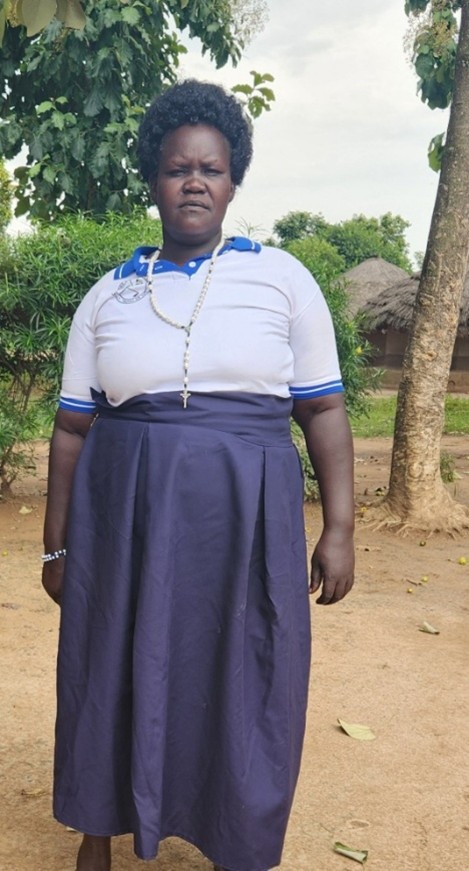
Awor Madoline CBF of AFRII- CASCADE in Adwoa parish, Ogur sub/county, Lira District.
Then CASCADE came to her community and chose her for training to become a community leader. This was unusual because in her culture, men usually take leadership roles in farming. But CASCADE challenged this norm, recognising that women’s lived experiences with food insecurity positioned them as powerful agents of change. They believed that women could be equally, if not more effective leaders, precisely because they intimately understand the daily struggles of feeding and sustaining their families.
Through the training, Madoline learned better farming methods. She discovered how to use improved seeds, better tools and proper farming techniques. The results were amazing; her sunflower harvest doubled to 800 kilograms per acre. This success changed everything for her family and gave her confidence to help others.
In addition to boosting her yields, Madoline also learned the importance of growing and preparing nutritious food for her household. With guidance from CASCADE, she began incorporating more diverse and nutrient-rich crops into her family’s meals, including vegetables and legumes. This shift significantly improved the health and well-being of her children, who previously suffered from frequent bouts of malnutrition. “I moved from hand hoes to ox plough. From selling poor quality seeds to quality seeds. That is transformation,” Madoline says. But her transformation wasn’t just about farming tools it was about becoming a leader in a community where women rarely held such positions.
CASCADE then trained Madoline to become a community-based facilitator, putting her in charge of helping 250 other farmers in her area. This was a big responsibility, but Madoline was ready. She had experienced the struggles herself and knew exactly what other farmers needed. Her role became a vehicle for empowering others, especially vulnerable women, who often face multiple layers of exclusion.
Among the farmers Madoline trained was 58-year-old Acio Milly, a mother of 14 children. Despite having land to farm, she couldn’t afford good seeds, organic fertilizer or proper tools. Every season was a struggle just to grow enough food to keep her large family from going hungry.
“I had land, but with limited resources to cultivate it properly,” Milly remembers. “Every season was a struggle just to survive. Like many women in her community, Milly carried the heavy responsibility of feeding her family but lacked access to loans or credit to improve her farming. She, like countless other rural women, had no access to formal financial services often excluded due to lack of collateral such as land or property, which is typically owned or controlled by men.
Madoline recognized that Milly was one of the most vulnerable people in their community. In 2024, she helped Milly join a local savings group connected to the government’s Parish Development Model program. This was crucial because women like Milly usually can’t get loans from banks, as they often lack property to use as security, and banks often don’t take women farmers seriously.
Through this program, Milly received 1 million Ugandan shillings (USD 270) as an affordable loan. But more importantly, she received training on how to use this money wisely. CASCADE’s approach isn’t just about receiving money; it is about equipping people especially marginalized groups with the knowledge to manage it effectively. This support included financial literacy and enterprise management, empowering them to make sound and sustainable business decisions.
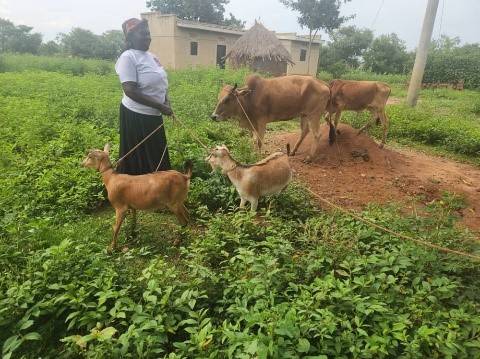
Milly taking her animals to graze.
Milly made very clever choices with her loan. She used 400,000 shillings to rent better land and buy improved maize seeds and organic fertilizer. Another 400,000 shillings was spent on purchasing a heifer and she used the remaining 200,000 shillings to acquire breeding goats.
With training on family nutrition under CASCADE, Milly also prioritized food security at home. She began using part of her maize harvest for home consumption, ensuring her children had daily access to healthy meals. The milk from her heifer added a vital protein source to their diet, contributing to a noticeable improvement in their energy and health.
The results were incredible. Within four months, Milly harvested 35 bags of maize – far more than she had ever grown before. She sold 15 bags to make money and used the profits to buy more goats. Her livestock also began producing milk and giving birth, creating even more income.
“Before PDM, I had land but with limited resources to cultivate it. Now I have seeds, animals and hope. I am no longer a beggar, I am an inspiration to the community,” Milly says proudly. Her transformation reflects the economic and social empowerment of rural women when given the tools, trust, and training.
The program also supported men in the community, like 59-year-old Yuventino Odongo, a father of six. For years, Yuventino had struggled to support his family through small-scale farming and casual labour taking on any temporary work he could find, like construction or farm work for other people.
This kind of work is tough and unreliable. Some days there would be work, other days there wouldn’t be. The pay was low and it was physically demanding. Yuventino wanted something better for his family but didn’t know how to break out of this cycle.
When Madoline identified Yuventino as someone who could benefit from the program, she helped him join the same savings group as Milly. He also received a 1-million-shilling loan and training on how to use it effectively. While the primary aim was empowering women, inclusive support ensured shared prosperity and balanced household decision-making.
Yuventino decided to focus on poultry farming raising chickens and turkeys. He used his loan to buy young birds, build proper shelters for them and purchase vaccines and feed to keep them healthy.
Within six months, Yuventino’s turkey flock had grown to over 24 birds. During peak seasons, he could sell mature turkeys for 90,000 to 120,000 shillings each (about $25-33). His chicken business also grew to over 30 birds, giving him a steady income from selling eggs and chickens.
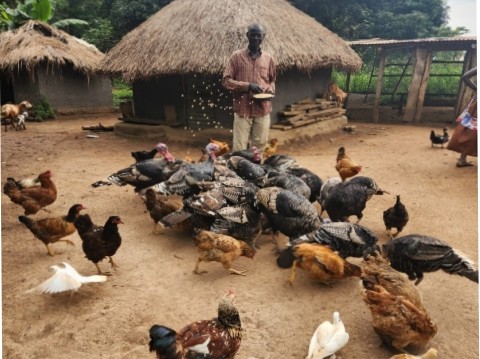
Yuvention feeding his birds.
“I used to admire poultry farmers from a distance. With PDM, I became one and even better, I now train others. I believe poverty can be defeated if we use opportunities well,” Yuventino explains. His success allowed him to stop doing casual labour and focus on his farming business. He even began teaching other men in the community how to raise poultry.
This story from Adwoa Parish represents one of many similar transformations occurring across CASCADE’s implementation areas. By linking 1,404 farmers to government programs across Acholi and Tooro regions, CASCADE demonstrates how community-based facilitation creates sustainable pathways out of poverty while strengthening local institutional capacity.
As CASCADE continues to strengthen its impact, this story from Adwoa Parish serves as powerful evidence that community-based facilitation, strategic government partnerships and targeted investments in women’s agricultural leadership can break the cycles of poverty and create lasting pathways to prosperity for rural communities in Northern Uganda. It reaffirms that investing in women’s leadership, inclusive training, and equitable access to resources is not only fair, it is transformative.
The Author is the Agronomy Officer at AfrII
AfrII, GAIN, consider collaborating beyond CASACDE
The Africa Innovations Institute(AfrII) and Global Alliance for Improved Nutrition (GAIN) are in talks to explore opportunities of collaboration beyond CASCADE.
The partnerships are intended to strengthen collaboration between the two organisations. CASCADE (CAtalyzing Strengthened policy aCtion for heAlthy Diets and resiliencE) is a five-year, 60-million-euro project, implemented in six African countries between 2022-2026. The project, a consortium between CARE and GAIN, is funded by the Dutch Government and aims to improve food security and reduce malnutrition of women and children under five.
In a meeting held at the AfrII offices in Bukoto, Kampala, last month, the CEO of AfrII, Prof. George William Otim-Nape, outlined the setup of AfrII as an innovation institute focusing on 5 key areas; Agriculture and food security, environment and climate change, food systems and climate change and capacity building.
He emphasised the uniqueness of AfrII which conducts research, knowledge and technology generation, but with its primary focus on innovations. This makes it work in close collaboration and partnership with national and international institutions, “AfrII has built a global network of partners and we would be so happy to work with GAIN in their areas of mandate,” Otim-Nape.
Prof. Otim-Nape highlighted key outstanding achievements in the area of cassava, where AfrII worked with different industries to make new products from cassava. Uganda Breweries developed a beer, Britania and Riham made biscuits, Hot Loaf made bread fand Katoon Industries developed paperboard, among others.
AfrII key focus areas include; agriculture and livelihoods; environment and climate change; food systems and nutrition; innovations and business development; capacity and organizational development; and partnerships
The institute has implemented key projects implemented like CAVA, Vital Signs, Livestock for Livelihood, CBIT I &II, Water in the cattle corridor, Shear landscape restoration, CASCADE, IMMANA I&II and Drivers of Food Choice among others.
AfrII in the future hopes to expand to East Africa and advance sustainable development through cutting edge research and Global Partnerships.
The Country Director for GAIN Mr. Enoch Musinguzi, highlighted GAIN’s mission to advance nutrition outcomes by improving the consumption of nutritious and safe food for all people, especially the most vulnerable to malnutrition.
Noting that GAIN works on nine key areas, that is, food fortification including biofortification for all staples, public private sector partnerships via SUN business network (SBN) led by GAIN, the nutrition financing facility, nutrition governance and policy, innovations in school feeding, school feeding policy, Mr. Musinguzi explored the opportunities for collaboration with AfrII beyond CASCADE.
The discussions centred around interventions and innovations in nutrition, food safety and hygiene, food marketing and demand generation for proper nutrition, school and workplace nutrition, breast feeding corners in the workplaces, the fast foods sector, among others.
The CASCADE project team conducts learning visits to scout simple sustainable technologies for adoption
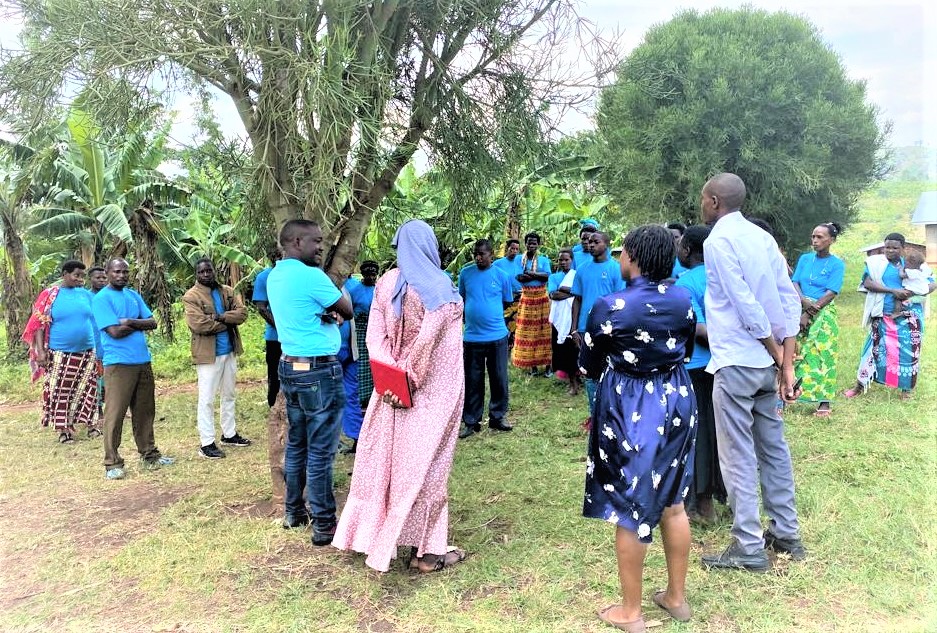
The CASCADE Project team interacts with farmers during the recent field visit in Kabarole district.
Wednesday 16th/August/2023– The AfrII CASCADE team on a recent field visit to Masongora women’s irrigation farmers group in Masongora Village, Kabende Sub County, Kabarole district. The team, including the Project Coordinator Dr. Muniirah Mbabazi, and Project Manager Mr. Wilson Kirabira, met and interacted with the women’s group to learn from their group demo and support other groups to establish similar demonstration sites. The group disclosed that it strategically set up its demo site close to a swamp and erected a water pump from which continuous water runs to feed the gardens. Among the crops grown on the demo are cabbages, carrots, and sweet potatoes. Through this simple water irrigation equipment, these crops are assured of continued water supply even during the dry seasons. These simple and user-friendly sustainable water technologies are what the project intends to extend to and promote to target farmer groups with the aim that these are adopted and put to maximum use by the beneficiaries. The learning visit was successfully coordinated by the AfrII Nutrition Hub Officer (FortPortal), Ms. Winnie Mirembe.

A farmer takes Mr. Wilson Kirabira and Dr. Muniirah Mbabazi on a tour of the demonstration plot
The project team also successfully visited the Gulu and Karamoja hubs for related activities.
The CASCADE project is funded by the Netherlands Ministry of Foreign Affairs through Care International.
District Officials in Northern Uganda Commit To Prioritize Nutrition Driven Agendas
The Lamwo District Health Assistant, Mr. David Nyeko highlighted poor WASH and disease burden as the main drivers of malnutrition, with malaria incidences as high as 43% in the district. “Food insecurity due to high prices of nutritious foods is largely to blame for the high malnutrition in food baskets of Agoro and Lokung sub-counties” he noted while presenting a speech on behalf of the Lamwo District Nutrition Focal Person. He also reported that nutrition screening was ongoing in the district and that rehabilitation of malnourished children was being done, though stock outs of essential commodities was a challenge.
He made the remarks during the recent Lamwo District Nutrition Coordination Committee meeting that convened at Cactus Hotel on Wednesday. The meeting was called by the Lamwo Chief Administrative Officer to discuss the status of the District Nutrition Action Plan and the status of nutrition in the district. In this meeting, The CAtalyzing Strengthened policy aCtion for heAlthy Diets and resiliencE (CASCADE) project implementing partners submitted progress updates and challenges faced during implementation. Specifically, the Africa Innovations Institute (AfrII) highlighted what it intends to do to ensure that women of reproductive age and children Under 5 years access and utilize nutrient dense foods throughout the year.
The District Chairperson, Mr. David Odongmadiki appreciated the continued support from NGOs and committed to continue supporting them in their work. He stated that “a healthy family is productive” and stressed the need to work in harmony with the district to achieve this. The district officials are yet to conduct a council meeting to finalize the passing of the District Nutrition Action Plan (DNAP).
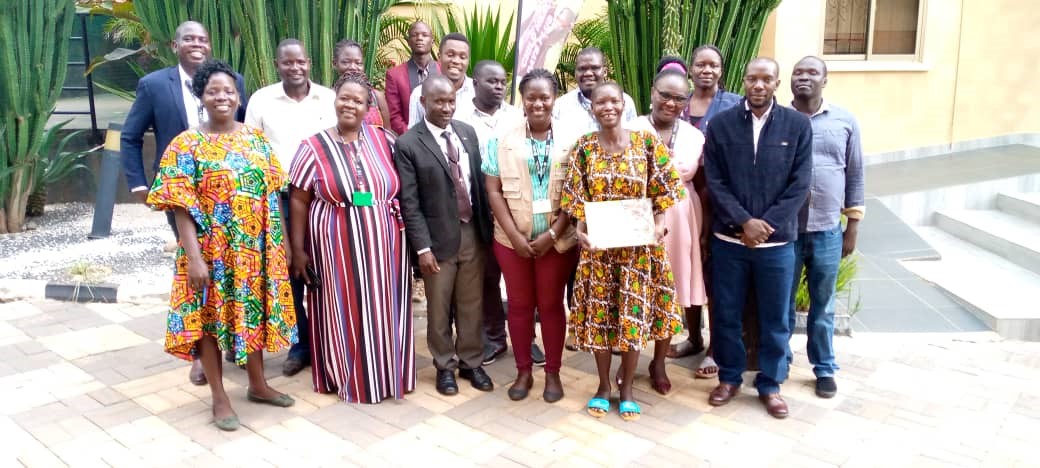
The District officials and partners during the recent Lamwo DNCC meeting held at Cactus hotel. (On the right -front row)- AfrII’s Mr. Emmanuel Owiny, the CASCADE Nutrition Officer for the Gulu Hub.
CASCADE is a multi-country project implemented in 6 countries in Africa including Uganda. The project aims to improve food security and contribute to the reduction of malnutrition of at least 1 million Women of Reproductive Age (WRA) and Children in Benin, Ethiopia, Kenya, Nigeria, Mozambique, and Uganda. In Uganda, CASCADE will be implemented in a selected 15 districts in the Acholi, Tooro, and the Karamoja Regions. These districts were selected owing to the high levels of malnutrition, poverty, and displaced populations. The CASCADE will be aligned with the Nutrition for Growth (N4G) commitments and Uganda’s UNFSS pathway to transform food systems and seeks to operationalize actions deemed to reduce malnutrition among women and children in the Uganda Nutrition Action Plan II (UNAP II). Under CASCADE, AfrII will implement domain 4 which seeks to strengthen women’s capacities to benefit from nutrition-related policies by enabling them to produce, prepare and consume healthy diets.
The CASCADE Project is funded by the Netherlands Ministry of Foreign Affairs through Care International.
AfrII Team Fast-Tracks CASCADE Project Implementation

Tuesday 16th/05/2023: – The Africa Innovations Institute (AfrII) CASCADE project team earlier today held a virtual meeting to share progress on project implementation, operations, challenges and upcoming activities aligned for the projects progress. The team holds regular internal meetings to keep abreast of project progress for a smooth implementation in selected districts in the Karamoja, Acholi and Tooro regions.
In attendance was the AfrII CEO Prof. G.W. Otim-Nape, the Project Coordinator- Dr. Muniirah Mbabazi, the Nutrition and Innovations Manager-Mr. Wilson Kirabira, Hub officers; Ms. Winnie Mirembe, Mr. Emmanuel Owiny, and Mr. Brian Kipkemoi. Also present was the Finance Officer-Ms. Kia Brenda and the Administrator -Ms. Sylvia Ayebare.
The CAtalyzing Strengthened policy aCtion for heAlthy Diets and resiliencE projet (CASCADE) is a multi-country project implemented in 6 countries in Africa including Uganda. The project aims to improve food security and contribute to the reduction of malnutrition of at least 1 million Women of Reproductive Age (WRA) and Children in Benin, Ethiopia, Kenya, Nigeria, Mozambique, and Uganda.
The CASCADE Project is funded by the Netherlands Ministry of Foreign Affairs through Care International.



